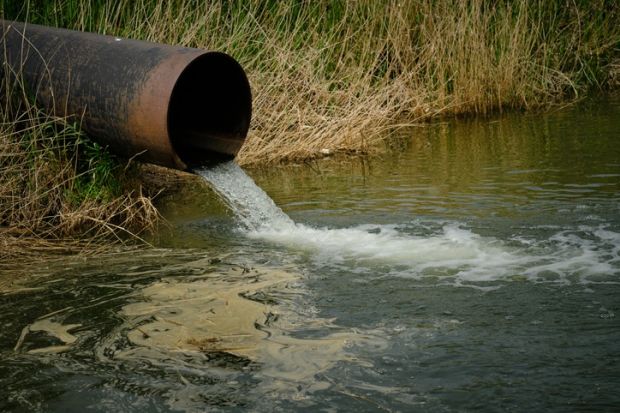The fact that the Universities Superannuation Scheme (USS) did not mention on its news and events web page last month that it had written down a major investment to zero is telling.
The USS has kept shtum about its role as a major investor in Thames Water, the UK’s largest water company, even as news emerged about the firm’s precarious financial situation and its unfortunate habit of discharging sewage into local rivers – which has today led the regulator, Ofwat, to propose a fine of £104 million, or 9 per cent of its revenue.
The USS holds about 20 per cent of Thames Water, and it is not the only pension fund with money in the firm or one of its “associates”. The Ontario Municipal Employees’ Retirement System (OMERS) has a nearly 32 per cent stake, but it was quicker to throw in the towel, writing off its investment in May after Ofwat declared Thames Water “uninvestible”.
Indeed, the company has now been declared in breach of Ofwat’s conditions for maintaining a licence to operate after its debt was cut to “junk” status by two major ratings agencies.
The USS reportedly valued its stake at almost £5 billion in March 2022, which would put OMERS’ loss at over £1.5 billion and the USS’ at about £1 billion. This is only 1.3 per cent of the USS’ assets of about £75.5 billion, but it is not to be sneezed at – or, perhaps, it should be sneezed at rather hard.
As a major investor, the USS was entitled to a representative on the board of the companies concerned. Such a director enables the asset owner to keep an eye on what is going on. Moreover, the USS is keen on telling us that it’s a “responsible investor”. So it should have been keeping its eye on the financial engineering that Thames Water and its associates were engaging in – engineering that went so badly wrong that the firm is in line to be placed into a special administration regime or maybe even to be renationalised.
The USS also makes frequent reference to its environmental, social and governance (ESG) credentials. Did the board representative say anything about discharges of sewage? Did he even ask? We just don’t know, but there is no public evidence that he did.
Maps in the USS’ 2020, 2021 and 2022 annual reports showed “infrastructure investments” that pinpoint renewable energy and wind farm sites, Heathrow Airport and National Air Traffic Services, but not Thames Water. The firm also received scarcely a mention in text or tables – investments in it being contained under a broad heading of private equity.
Nor did the USS comment on the recent shenanigans, saying that it regards individual investments as items of commercial confidence. But with respect to “press speculation” about Thames Water’s financial situation, it did see fit in March 2023 to play down any problems. In January 2024, it told us about how it had a role in providing “patient capital”.
In its last statement, in May 2024, titled “Thames Water: an update on our investment”, the USS contented itself with giving reassurances “that our diversified investment portfolio means no single investment on its own can endanger our ability to pay members’ pensions when they’re due”.
Hence, the fact that it devoted paragraphs in its 2024 report, published on 25 July, to saying how disappointed it was that its “efforts had not borne fruit” are likely to have come as a shock to many of its members. Yet even then, the full size of the loss wasn’t disclosed – no numbers were quoted.
USS members might be asking whether a loss of “only” 1.3 per cent of assets really matters. It might not – in the short term. But private equity, in which USS is heavily invested, has not been doing well – including since March 2024, the year to which is covered by the USS annual report.
On the liabilities side, recent falls in interest rates, which members with mortgages might have cheered, push up pension fund liabilities. And all indications are that central banks will bring rates down yet further.
Under the accounting standards used by the UK Pensions Regulator, the USS already has a deficit of £200 million – down from a £2 billion surplus reported a year previously. If this worsens, the same responses that have been seen from university employers in the past – higher contribution rates and less generous replacement rates – will be back on the agenda.
Many universities are already in financial difficulties, closing departments and announcing redundancies; if they are required to make additional “deficit payments” into the scheme, they will face yet more financial pain. Every pound that Thames Water failed to deliver to the USS is a potential pound less that is available to pay for better salaries, working conditions, libraries and so on.
Nor will members enjoy being asked why their retirement fund did nothing to stop environmental degradation by a company over which it had oversight. It’s time they and their representatives started asking a few questions of their own.
Bernard H. Casey is a retired academic and USS member who has written extensively on pension finance. He can be contacted via SOCial ECONomic RESearch.
POSTSCRIPT:
The opening paragraph of this article has been amended.
Register to continue
Why register?
- Registration is free and only takes a moment
- Once registered, you can read 3 articles a month
- Sign up for our newsletter
Subscribe
Or subscribe for unlimited access to:
- Unlimited access to news, views, insights & reviews
- Digital editions
- Digital access to THE’s university and college rankings analysis
Already registered or a current subscriber? Login





